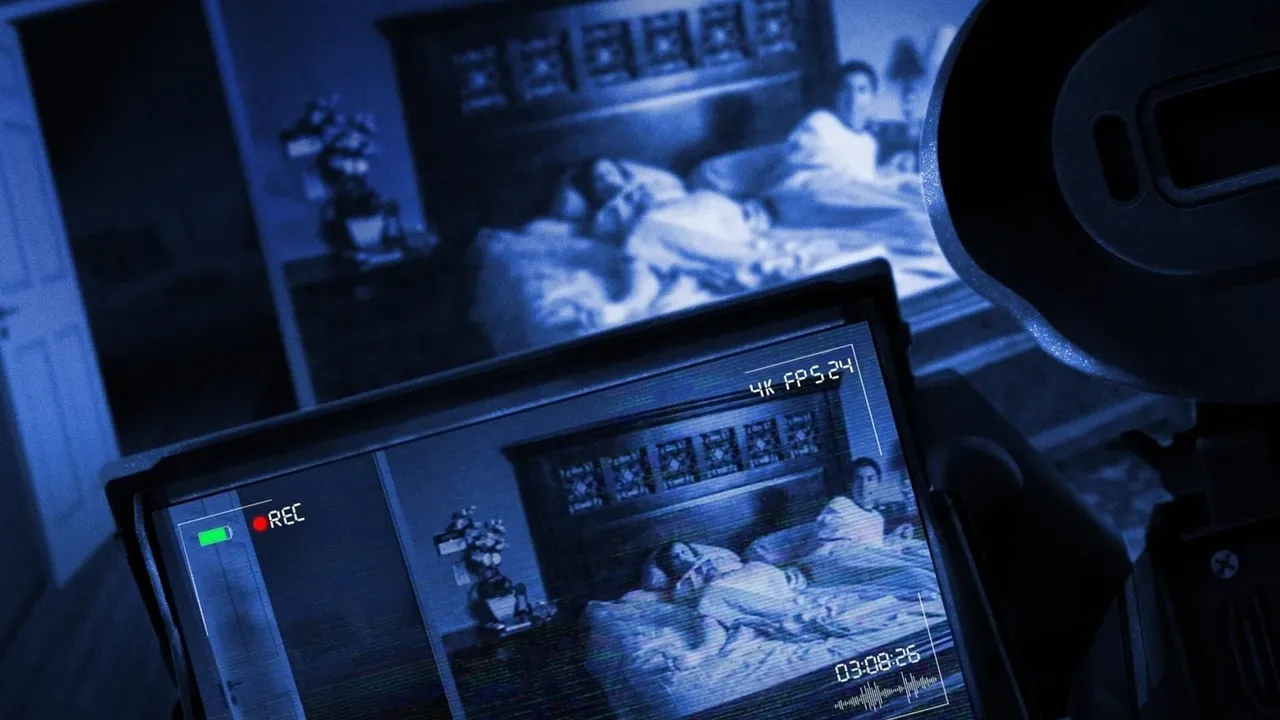There's few things as fun to watch as a good making-of documentary. Nine times out of ten, this stems from the fact that it's just plain fascinating to find out exactly how the creators pulled off a particular moment in a film, game, or show, and it often leaves you with a greater appreciation for the finished work. After all, with how difficult the act of creating something is, every movie, no matter how bad, is something of a tiny miracle. Unknown Dimension, a documentary about the rise and fall of the once-dominant Paranormal Activity franchise, stands among the best of these works. It's not just an in-depth examination of how the franchise came to be, but it's also a shockingly honest, funny, and surprisingly brutal post-mortem on how it all fell apart.
There's an undeniable scrappy charm to the earlier installments of Paranormal Activity, an energy captured quite well with the documentary's interviews with Orin Peli, the first film's director, and Katie Featherston/Micah Sloat, it's stars. Listening to Peli describe his influences, both The Blair Witch Project and Cannibal Holocaust, and his willingness to put his livelihood on the line, ripping up his own home to make it easier to shoot in, is genuinely affecting. The first film, strange as it is to say, was a real experiment, a bold swing made on a shoestring budget by a handful of people, and it's satisfying to watch it succeed as we see just how much was riding on it.
With success, of course, comes a demand for more, at which point other producers and writers, responsible for the franchise's increasing emphasis on lore and continuity, come into play. Particular favorites of these talking heads are superstar producer Jason Blum (hilariously framed with an Emmy next to him and a poster for Get Out over his shoulder) and Christopher Landon, an honest, passionate writer whose attempts to weave a cohesive narrative enabled the franchise to limp along for as long as it did. These interviews are often frank and deeply informative about every step of the creative process. We see directors pitching their ideas and venting their creative limitations, producers discussing the advantages of working with low budgets, and actors earnestly discussing the roles that would serve as a springboard for most of them. (Katie Featherston is rightfully given praise for being the franchise's glue, both in terms of showing up in most of them and also for her great physical performance as a possessed Katie.) As the franchise hits its heyday, making wild profits and inspiring a deluge of imitators, you can see a real enthusiasm for the project, from Landon's intervention to ensure 2 is a stronger project to the inspired hiring of the directors of Catfish to helm the third entry. It's even full of fun "how did they do that?" moments, like Henry Joost and Ariel Schulman showcasing a camera attached to an oscillating fan and how they expertly used it to create tension. There's a creativity and apparently genuine passion to ensure these succeed, and that energy is strangely infectious.
Of course, all good things must come to an end, and this franchise is no different. Like any great disaster, the retrospective takes a harsher tone after the third film as our various talking heads begin furiously pointing fingers. With zero hesitation, Jason Blum says 4 and Ghost Dimension are easily the worst of the franchise, while Christopher Landon mournfully admits to handing the finale's director an impossible job with a wistfulness that made me laugh so hard my roommates had to pause the movie. With the franchise dead and (at the time of production) buried, it allows for much-appreciated honesty from the interviewees. Jost and Schulman, in particular, have some great excerpts about the production of 4, discussing how their creative pitch for a road trip was quickly tossed aside in favor of a product where they had little autonomy. Laughs and smiles are had by all, of course, but the bitter undertone of it all adds a lot of bite. Even an effort by Landon in the director's chair (the very fun Marked Ones) can't quite reverse the woes, even if, hilariously, he breaks the supposed cardinal rule of the franchise by not making a haunted house movie.
The ultimate conclusion of Unknown Dimension is an interesting one. For all the finger-pointing and discussion of the sequel's shortcomings, you get the sense that everyone realized that the found footage fad had run its course. The ultimate surrender comes in the form of Landon and Peli, who admit to fighting tooth and nail against making the franchise 3D, only to throw their hands up for Ghost Dimension, a clunker that puts the final nail in the coffin. Even Featherston, whose presence makes for a fun treat throughout the series, didn't bother to appear. Blum, sagely, admits that he considers the film the series lowest point and subsequently washes his hands of the franchise, but subsequently uses the style of production when he founded Blumhouse. It's a surprisingly glum ending, but even in this moment, you can't help but feel fulfilled by the experience.
Unknown Dimension is a refreshingly honest take on the "making of" documentary, willing to dissect its parent series shortcomings while still treating it with a degree of fondness and reverence. It's everything you would want a movie like this to be: full of interesting filmmaking tidbits and a genuine emotional arc. And, like any good horror movie, it ends with the killer lurching to life with a hilariously foreboding tease for Next of Kin, a film that I'm certain will be the shot in the arm this series needs. Now, time to take a big drink of coffee and check out the reception...


No comments:
Post a Comment